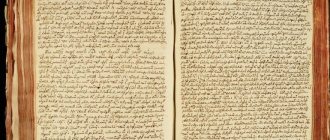Text of prayer Psalm 85
The song can be sung both in Church Slavonic and in Russian. Usually the Church Slavonic version is chosen when it is necessary to conduct a service in a church. The Russian text of the prayer is used in an intimate home environment.
In Church Slavonic
In Russian
Prayer to David
1 Incline Your ear, O Lord, and hear me, for I am poor and needy. 2 Preserve my soul, for I am reverend: save Thy servant, O my God, who trusteth in Thee. 3 Have mercy on me, O Lord, for I will cry to You all day long. 4 Make glad the soul of Your servant, for I have taken my soul to You. 5 For You, O Lord, are Good and Meek, and Most merciful to all who call on You. 6 Inspire, O Lord, my prayer, and attend to the voice of my supplication. 7 In the day of my tribulation I cried out to You, because You heard me. 8 There is no one like You in God, O Lord, and there is no one according to Your works. 9 All the nations that you have created will come and worship before You, O Lord, and glorify Your name, 10 for You are great, and You work wonders, You are the only God. 11 Teach me, O Lord, in Thy way, and I will walk in Thy truth; Let my heart rejoice in fearing Your name. 12 Let me confess to You, O Lord my God, with all my heart, and I will glorify Your name forever: 13 For Your mercy is great upon me, and You have delivered my soul from the lowest hell. 14 O God, the transgressors rose up against me, and the host of the powerful sought my soul, and did not offer it to You before them. 15 And You, O Lord my God, Generous and Merciful, Long-suffering, and Much-merciful and true, 16 Look upon me and have mercy on me, give Your power to Your servant, and save the son of Your servant. 17 Do a sign for good with me, so that those who hate me will see and be ashamed, because You, Lord, have helped me and consoled me.
Interpretation of Psalm 85
- Verses 1-5. It is difficult for the author to find a safe place where enemies will not reach him. His plight leaves an imprint on the lines of the work. David begs the Lord for help and protection. Confident in the power of God, the king devotes his entire life to Him.
- Verse 6-10. The author is confident that the Creator will hear him and bring peace to the Earthly Kingdom. David's faith is unshakable and his words are prophetic. He says that the faith that the Jewish people protects will soon become the property of all humanity, God will penetrate the souls of everyone.
- Verses 11-17. David realizes that without the protection of the Almighty, it is impossible to live a righteous and happy life. He asks Him to grant His grace to follow the path of the pious. David mentions the importance of his faith, his devotion to God's Laws. As a man, he committed sin, but tried to cleanse himself from it. He asks God only for support and strength for his future life.
Orthodox Life
Metropolitan Anthony (Pakanich) about the psalm, with the help of which a way out is found in the most hopeless situations.
Psalm 85 is one of the most tragic and pleading. In it you can hear the cry of the soul, the last hope for help, the recognition of one’s complete powerlessness.
This psalm was included in the prayers of the 9th hour, which is dedicated to the remembrance of the Savior’s death on the Cross. According to the words of the holy evangelists Mark and Matthew, it was “at the ninth hour” that Christ uttered a pleading cry on the Cross for the last time: “My God, My God! Why have you forsaken me,” followed by the words: “Father! I commit My spirit into Your hands. And having said this, he gave up the ghost” (Luke 23:46).
There is no point in talking about the tragedy of the moment. It is the darkest and most terrible in the history of mankind. Hopelessness. Nightmare. Darkness. But all this horror is for a while, until our soul breaks through the darkness to the Light.
“Incline Your ear, O Lord, and hear me, for I am poor and needy. Preserve my soul, for I revere You; Save, my God, Thy servant who trusts in You."
Lord, hear me! Bring down to me, the weak, my pain. There is no strength to endure anymore. My cup is overflowing. You are my only hope and protection. I appeal to You, my God. Hear me!
“Have mercy on me, Lord, for I cry to You every day”
My thirst for You knows no bounds, my love knows no obstacles, my soul constantly yearns for You, my heart never stops.
“Make glad the soul of Your servant, for to You, O Lord, I lift up my soul, for You, O Lord, are good and merciful and abundant in mercy to all who call on You. Hear, O Lord, my prayer and listen to the voice of my prayer. In the day of my tribulation I cry to You, because You will hear me."
I pray to You, Lord, have mercy on me! These words are the only thing left for me. I know, Lord, that you hear me, that you know about my sufferings. Prayer to You gives strength and consolation, allows you to throw off the heavy burden of accumulated experiences, cleanses the soul, and makes it possible to continue to bear your cross.
“There is no god like You, O Lord, and there is no work like Yours. All the nations created by You will come and worship before You, O Lord, and glorify Your name, for You are great and do wonders - You, O God, are You alone.”
May I have one thought - about You. Save me, Lord! I will hate the words of the world, that my heart may see You. I will serve you alone.
“Teach me, O Lord, in Thy way, and I will walk in Thy truth; establish my heart in the fear of Your name. I will praise You, O Lord my God, with all my heart and glorify Your name forever, for great is Your mercy toward me: You have delivered my soul from the lowest hell.”
I will stand in the fear of God, so that he will destroy in me all the passions that want to separate me from You, Lord. I will keep my lamp burning, making sure that it does not go out and plunge me into darkness. I will fill the vessel with oil while I am still in the body, so that it will shine and lead me into Your Kingdom. A bright soul has a luminous lamp, an evil soul has no light, it falls into darkness.
I repent, Lord, and renounce sin.
"God! the proud have risen up against me, and a crowd of rebels seeks my soul: they do not represent You before them. But You, Lord, generous and merciful God, long-suffering and abundantly merciful and true, look upon me and have mercy on me; Grant Thy strength to Thy servant and save the son of Thy servant; show me a sign for good, so that those who hate me may see and be ashamed, because You, O Lord, have helped me and comforted me.”
He who knew Your glory passed through unbelief, he who knew love renounced hatred, he who knew purity fled from impurity, he who knew good hated evil.
Everything that comes from You is for good. This gives me comfort in dark times, keeping my lamp lit.
Blessed is he who calls upon You. Blessed is the one to whom You open yourself and respond.
Have mercy on me, O God, according to Your great mercy!
Recorded by Natalya Goroshkova
Four virtues[edit]
Verse 10 of the KJV describes the virtues as a meeting: “Charity and truth meet together; righteousness and peace kissed each other" in erotic imagery [18], which became a popular theme for works of art from the Middle Ages to the 18th century. [8] These include paintings by Tiepolo, Lanfranco, Pompeo Batoni, Nicolas Prévost and Laurent de La Hire. [8] In 2003, American artist John Augustus Swanson painted Psalm 85
. [19] [20] The verse was also engraved on the papal tiara, which Napoleon presented to Pope Pius VII.
The four virtues: Mercy, Truth, Righteousness (or Justice) and Peace are allegorized as the Four Daughters of God. [21] The psalm is also quoted in nonviolent movements, such as the 1993 US Catholic Bishops document, which contains the verse “for he will speak peace to his people.” [22]
- Mercy and truth
, 13th century
- Der Kuß von Gerechtigkeit und Friede
, Antwerp, approx. 1580
- Kiss of peace and justice
by Laurent de La Hare, 1654
- Justice and peace
by Tiepolo, 18th century
Hymns and musical settings[edit]
Paul Gerhard paraphrased Psalm 85 in the hymn "Herr, der du vormals hast dein Land", which is part of the German Protestant hymnal Evangelisches Gesangbuch
like EG 283.
Benedixisti Domine in 1681/1682
H.181, for 3 voices, 2 treble instruments and continuo.
Heinrich Schütz set the German rhymed version in Becker's Psalter, Herr, der du vormals gnädig warst
(Lord, you who were merciful before), SWV 182.
The themes of verses 9 to 11 were paraphrased in John Milton's hymn "The Lord Cometh and Will Not Delay". [17]
Links[edit]
- ↑
Parallel Latin/English Psalter/Psalmus 84 (85) Archived May 7, 2022 at the Wayback Machine Medievalist.net - ^ a b Nulman 1996, p. 209.
- ^ ab Guzik, David (2019). "Psalm 85 - Prayer for Revival and Restoration". The indestructible word
. Retrieved January 19, 2022. - Abramowitz, Rabbi Jack. “Truth, meet kindness. Kindness, it's true." Orthodox Union
. Retrieved January 19, 2010. - Bromiley 1995, p. 44.
- "Midrash Tehillim/Psalms 85" (PDF). matsati.com. October 2012. Retrieved January 19, 2022. (password: www.matsati.com)
- Calvin, John (1847). Commentary on the Book of Psalms. III
. Translated by Anderson, James. Society of Calvin Translators. pp. 366, 367. - ^ abc Rosenberg and Funaroli 1982, p. 252.
- ^ab Eder, Sigrid (July 2022). “Do Justice and Peace Really Kiss Each Other?” . Vetus Testamentum
.
67
(3):387–402. DOI: 10.1163/15685330-12341284. - "Throwing Truth to the Ground" (PDF). elmad.pardes.org. January 2017. Retrieved January 19, 2022.
- "Teillim - Psalms - Chapter 85". Chabad.org. 2022. Retrieved January 26, 2022.
- Nulman 1996, p. 317.
- Jump up
↑ Brauner, Reuven (2013). "Shimush Pesukim: A Comprehensive Index to the Liturgical and Ceremonial Uses of Biblical Verses and Passages" (PDF) (2nd ed.). paragraph 42. - Scherman 1987, p. 64.
- "Psalms for Special Occasions". Psalms online
. Retrieved January 19, 2022. - Cantica 2022.
- Psalter 2022.
- Portier-Young 2014, p. 328.
- "Psalm 85" (2003)
- Gates and Mann 2012, pp. xxi–xxiii.
- Jump up
↑ Lavin 2005, p. 178. - McCarthy 2012, p. 183.
Sources [edit]
This article incorporates text from free content. . Text taken from Holy Scripture, Jewish Publication Society of America. To learn how to add clear text license to Wikipedia articles, see this instructions page. For information on reusing text from Wikipedia, see the terms of use.
[[Category: Free materials from the Jewish Publication Society of America]]
- Bromiley, Geoffrey W. (1995). International Standard Bible Encyclopedia. Wm. B. Eerdmans Publishing. ISBN 9780802837851.
- Gates, Jamie; Mann, Mark, ed. (2012). Cultivating the Prophetic Imagination. Wipf and Stock Publishers. ISBN 9781621895886.
- Lavin, Irving (2005), "Bernini in St. Peter's Basilica: Singularis in Singulis, in Omnibus Unicus", in Tronzo, William (ed.), St. Peter's Basilica at the Vatican
, Cambridge University Press, ISBN 9780521640961 - McCarthy, Eli Sasaran (2012). Becoming a Nonviolent Peacemaker: Virtue Ethics for Catholic Social Teaching and US Policy. Wipf and Stock Publishers. item 183. ISBN. 978-1-62-189854-2.CS1 maint: ref duplicates the default (link)
- Nulman, Macy (1996). Encyclopedia of Jewish Prayer: Ashkenazi and Sephardic Rites. Jason Aronson. ISBN 1461631246.
- Portier-Young, Anathea E. (2014). Apocalypse versus Empire: Theologies of Resistance in Early Judaism. Wm. B. Eerdmans Publishing. p. 328. ISBN 978-0-80-287083-4.CS1 maint: ref duplicates the default value (link)
- Rosenberg, Pierre; Funaroli, Mark (1982). France in the Golden Age: Seventeenth-Century French Paintings in American Collections. Metropolitan Museum of Art. ISBN 9780870992957.
- Sherman, Rabbi Nosson (1987). The Complete Artscroll Siddur
(2nd ed.). ISBN of Mesorah Publications, Ltd. 978-0-89906-6509. - "Liturgical Information/Third Sunday of Advent (B)". canticanova.com
. 2022. Retrieved January 19, 2022. - "Hymns for the 85th Psalm". gymnary.org
. 2022. Retrieved January 19, 2022.
Background and themes [edit]
Although the superscript attributes this psalm to the Sons of Korah, Christian commentators have been undecided on the period in which the psalm was written. One suggestion is that it was written towards the end of the reign of Saul. [3] Alexander MacLaren argues that the setting of Psalm 86 matches the description in the Book of Nehemiah, where only a portion of the Jewish people returned from Babylonian captivity. They returned "to a ruined city, to a fallen Temple, and to a land of sorrow, where they were surrounded by jealous and powerful enemies." [3]
According to Jewish commentators, the sons of Korah speak prophetically of the end of the Babylonian exile. They pray that God will also bring the Jewish people back from their current exile and completely remove their wrath. The imagery of the “meeting” of goodness and truth hints at the relationship between Israel's truth and God's righteousness. When Israel adheres to the truth, God will respond with righteousness; He will send rain to produce a bountiful harvest. [4] International Standard Bible Encyclopedia
also interprets the "kiss" shared by Righteousness and Peace (in the KJV translation) as meaning the spiritual union of "God bowing from heaven to earth and meeting the earth, rejoicing to Him, foretelling the glory of salvation for the people."[5]
According to Midrash Tehillim, the land referred to in this psalm is the Land of Israel, about which the Holy Scripture says: “The land that the Lord your God cares for; the eyes of the Lord your God are always fixed on her” (Deuteronomy 11:12). God expects the Jewish people to fulfill the mitzvot (biblical commandments) associated with the Land, such as tithing the harvest and keeping Shemita (Sabbath year) and Yovel (Year of Jubilee), and when they do, both they and the land will find favor in eyes of God. [6]
John Calvin summarizes the message of Psalm 85 as follows. After God's people returned from captivity in Babylon, they suffered further suffering. The voice of the people in the psalm cries out to God for deliverance on three points. Firstly, as a continuation of God's grace in returning people from captivity. Secondly, due to the long period of their suffering. Finally, in hope and confidence in God's promises of blessing. In this last point, Calvin links the restoration of Israel to the coming Kingdom of Christ. [7]
Kissing or fighting? [edit]
The image of "Justice and peace kissed" (KJV translation, Hebrew: צֶ֖דֶק וְשָׁל֣וֹם נָשָֽׁקוּ tseḏeq
wə- salo nāšāqū
) became a popular theme for works of art from the Middle Ages through the 18th century.
[8] However, the Hebrew root n-š-q
(Hebrew: נשק) has several translations, including "to kiss", "to fight" and "to fight against each other". [9] According to Eder, the word describes a dynamic type of contact, whether positive or negative. [9]
The Midrash understands this interaction in a turbulent context, relating it to God consulting with His angelic servants about creating the first man. The Midrash says:
Rabbi Simon said: “When the Holy One, blessed be He, came to create Adam, the ministering angels united in groups and parties, some of them saying: “Let him be created,” while others called: “Let him not be.” created.' Thus it is written: “Chesed [Kindness] and Truth fought together, Righteousness and Peace fought each other” (Psalm 85:11). Chesed said: “Let him be created, for he will distribute works of love”; Truth said: “Let it not be created, for it is made up of lies”; Righteousness said, “Let him be created, for he will do righteous deeds”; The world said, “Let it not be created, for it is full of strife.”
“What did the Saint do? He took the Truth and threw it to the ground. As it is written: “And the truth was thrown to the earth...” (Daniel 8:12). The ministering angels said before the Almighty: “Master of the worlds!” Why do you put your household leader to shame? The Almighty replied: “Let Truth arise from the earth!” This is what is meant when it is written: “Truth will arise from the earth”” (Psalm 85:12). [10]


